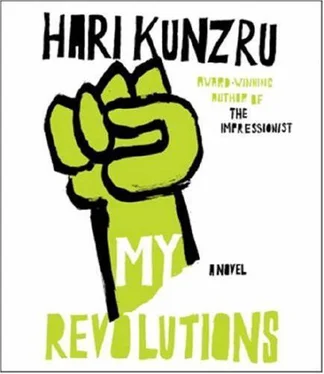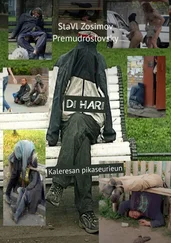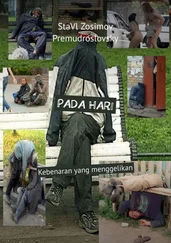Under Maggie and Colin’s influence I was reading books and working hard for my A levels. With my new confidence I’d acquired a new group of friends, boys my own age, with whom I listened to folk and modern jazz records, smoking cigarettes out of bedroom windows and talking about our various plans of escape from Ruislip. I’d applied to the London School of Economics: if I got in, I’d be able to go and live in hall.
As my exams came up, things at home got worse. Dad brought Mum home in a new hat with matching handbag, talking loudly and laughing a shiny, high-pitched laugh. Her brightness had something brittle about it, as if she were only performing her newly learned happiness, acting it out for our benefit. She had new pills too, which kept her awake. I’d hear noises in the kitchen at unearthly hours, three or four in the morning, and go down to find her rummaging in the cutlery drawer or polishing glasses.
Hello, dear, would you like some breakfast? For all her energy, she didn’t seem able to cook anymore, something about the complexity of it, the timing. There were small disasters, charred joints of meat, eggs at the bottom of pans brimful of cold water. Soon we were subsisting on a scavenger’s diet of canned food and fish and chips. Brian and Dad diverted themselves from their panic with breakages and shouting.
I spent as much time as possible out of the house, working in the public library or wandering around the West End, a habit I’d gradually developed since I first started taking the train into town for CND events. In drafty church halls I attended screenings of Bicycle Thieves and The World of Apu , accompanied by Czech cartoons in which people built walls and then all the flowers in the garden died. Soon I progressed to less elevated pursuits. Soho fascinated me, with its secret alleys and women sitting at upstairs windows, smoking and looking down at the street. There were coffee bars with rows of scooters parked outside. The amplified clatter of beat bands punched its way out of cellars. I didn’t dare go into these places. Sometimes I bought a frothy coffee in one of the quieter caffs and sat in a corner watching girls, hoping to be noticed.
I’d begun to despair of CND. There was something antique about it, something hopelessly polite. The year the Mods and Rockers fought on Margate beach, CND youth groups were up on the pier, offering donkey rides and a “non-violent Punch and Judy show.” “Don’t shout slogans as you march,” advised one of our leaflets. “This sounds ugly. Join in the singing, which sounds good and helps marchers along the road.” The warlords were trying to kill us but we had to be cheerful and take our litter home: good little citizens, asking nicely not to be irradiated. On the day I went on my first Easter march, the Committee of ioo held a sit-down demo at USAF Ruislip, just up the road from my house. I only heard about it afterward. Hundreds of people were arrested. While I was strolling around the West End singing “If I Had A Hammer,” people had been blocking the airbase gates.
Colin and Maggie disapproved of breaking the law. They said we had to show we were a responsible, rational part of society. If we were perceived as wreckers or undesirables, how could we hope to have an effect? We’d begun spending time at a folk club, held above a pub in Shepherd’s Bush. Maggie and I would watch as Colin, who’d been taking guitar lessons, went up to take his turn with the other amateurs before the professional singers did their sets. Sitting next to Maggie in the smoky darkness, I absorbed her high-mindedness and her optimism. I thought things were going to change; I was young enough to think the very strength of my desire for change would be enough.
Then came the 1964 election. The prime minister we derided as Homeosaurus (“Too much armor, too little brain, now he’s extinct”) was booted out and a Labour government came in. At meeting after meeting, speakers had assured me that once Labour were in power, they’d disarm. I believed them: the Labour Party stood for international brotherhood and peace. I was too young to vote, but I thought a Labour victory meant I was living in a country that made sense, a rational country where people knew that one day they’d die and until that day wanted to live, as fully as they could. Instead, the new prime minister, Mr. Wilson, made speeches about economic progress, the white heat of technology. We would be keeping our nuclear weapons and getting more. After all my efforts, all the lost Saturday afternoons and the boring meetings, “we” had won and still nothing was going to change.
I lost faith in CND and Maggie with it, as if somehow Wilson was her fault. With the discovery of her feet of clay, my idol became incapable of absorbing any more adoration. I had no vocabulary for what I was feeling, and such a hopelessly low self-image that had she ever shown any signs of reciprocating, I wouldn’t have dared touch her, but all the same I knew my chaste knight-errancy— one part Tennyson to two parts song lyrics — was no longer sustaining me.
One day I was in the West End, listlessly handing out CND leaflets outside a theater in Drury Lane, when a pair of Danish
students stopped to ask directions. Freja and Sofie were both pretty, one dark and one fair, over to see the galleries and tick off sites of historical interest in their guidebook. I soon realized they didn’t want to hear about the amount of strontium-90 in the bones of children under one year of age and began to brag about how well I knew Soho. This was only partly true. I’d never actually been through the doors of the fashionable places I was boasting about. Luckily the girls had as little money as I did, so I was saved the humiliation of being turned away from the Scene or the Flamingo. They said they wanted to hear some music, so I stuffed my leaflets back into my satchel and took them to Beak Street, where there was a basement club little bigger than my living room at Avon Close, a cheap dark cellar where the management wasn’t particular about the age of their clientele. I’d been there once or twice to lean against the back wall and smoke an affected cigarette. It was a place where I judged I wouldn’t be out of my depth.
Though it was early, the basement was packed with people watching a band playing covers of American rhythm-and-blues songs. At first we stood by a pillar, sipping our drinks to make them last. Then I danced, first with Sofie, then Freja, pressed close together by the jostling crowd. The place was unbelievably hot. Within minutes sweat was running down our faces and soaking our clothes. Droplets of moisture dripped from the ceiling, barely a foot above our heads. I danced with my eyes closed, dizzy and ecstatic. Freja draped her arms round my neck and I squeezed her against me, feeling her thighs moving under her damp cotton dress, the ridge of the bra-line bisecting her back. Then, as the band sang uh uh yeah yeah do you like it like that we were kissing, her fingers scraping away strings of wet blond hair from her mouth as we crushed our faces together and my hands traveled over the curve of her buttocks, the slippery nape of her neck. The hour of the last tube was edging closer and with it would have to come some kind of decision, but there was no contest, not really, because Freja was smiling and grazing my cheek with her knuckles and conferring with Sofie, giggling and whispering as I stood apart and nodded my head to
the music, lighting a cigarette, tapping my foot yeah baby oh baby oh in time and just to make sure taking off my watch and slipping it into my pocket.
By the time we left it was very late. We sat in a coffee bar and ate toasted sandwiches, smiling conspiratorially at one another. Sofie drew fingertip patterns in spilled tea on the Formica tabletop while Freja and I played footsie until there was no money left for drinks and all three of us started to yawn. Finally I confessed I had no way to get home, and they both laughed, as if I was being sly. Freja told me they’d try to sneak me into their hotel, and led me by the hand into Fitzrovia, to a townhouse in one of the bigger squares with an illuminated sign above the door saying the Richmond or the Windsor or something House. We hung around outside, prevaricating. Freja and I kissed and ran our hands over each other, almost clawing each other in desperation. Sofie hopped up and down a discreet distance away, hugging herself against the cold.
Читать дальше












